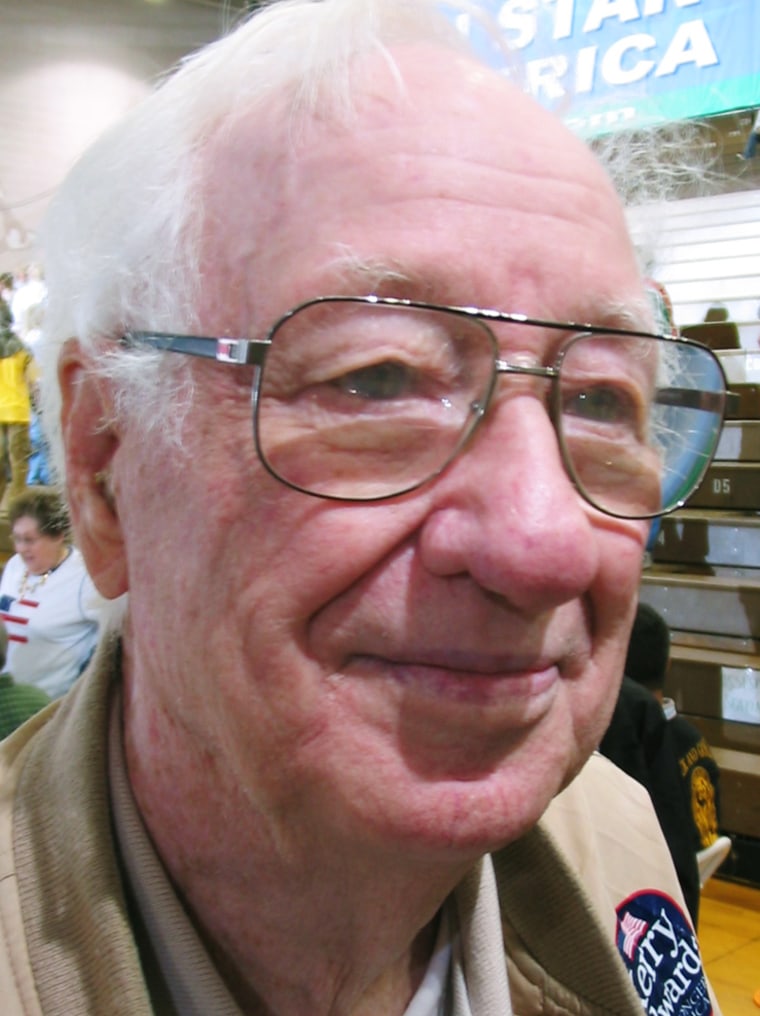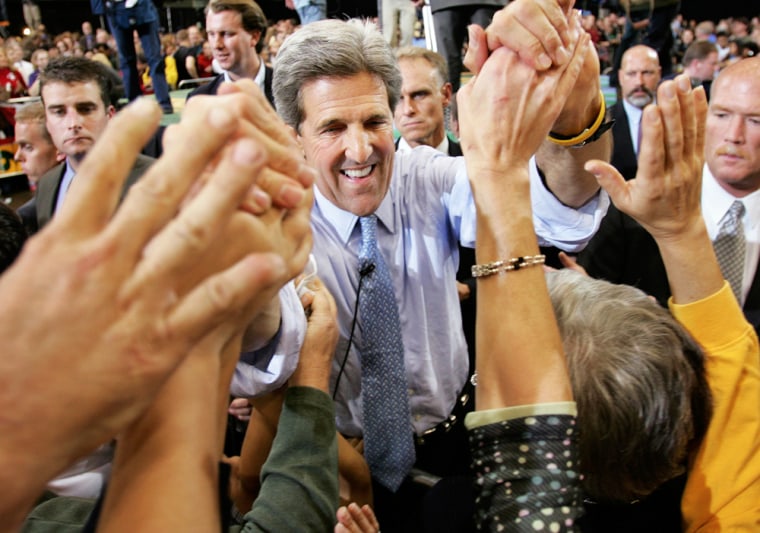With a new report that a cache of explosives that has dominated the campaign for the past four days may not have been in Iraq when U.S. forces invaded, Democratic presidential candidate John Kerry took two different approaches to the topic in Wednesday speeches in Sioux City and Cedar Rapids, Iowa.
The change-up, which also came after President Bush accused Kerry of weighing in on the explosives story "without knowing the facts," illustrated the minute-by-minute nature of the hectic final days of one of the closest races for the White House in U.S. history.
In the morning in Sioux City, the high point of Kerry's speech was his scathing attack on Bush and Vice President Dick Cheney whom he accused of allowing the high explosives to be removed from the al-Qaqaa site.
Kerry ridiculed Cheney as “the Chief Minister of Disinformation” and called the charges about the explosives “a growing scandal.”
He speculated that “the missing explosives could very likely be in the hands of terrorists and insurgents — who are attacking our forces 80 times a day on average.”
The key word in that sentence is “could,” since no one knows if any of the explosives are being used to attack U.S. soldiers or even if the explosives are in Iraq.
Meanwhile, ABC News reported Wednesday that Iraqi officials may have overstated the amount of explosives reported to have disappeared from the al-Qaqaa site. And the Washington Times reported Thursday that a Defense Department official said Russian special forces "almost certainly" took the explosives out of Iraq before the U.S. invasion in March 2003.
Kerry omitted mention of the explosives in his speech in Cedar Rapids nine hours after he spoke in Sioux City. He referred in general terms to Bush, saying, "In Iraq, we need a president who understands what's happening, who doesn't mislead the American people, who's willing to admit mistakes."
At both the morning rally and the evening event, Kerry told Iowans that their votes could make him president — and he’ll be even more grateful than he was when they made him the winner of the Iowa caucuses with an upset victory over Howard Dean.
On the trail in Iowa, Kerry drew good crowds Wednesday, but not overwhelming or frenetic ones. The atmosphere both among the 2,500 who showed up to hear him at a high school in Sioux City and the 8,000 who attended the rally at the U.S. Cellular Center in Cedar Rapids was one of excitement, but not messianic passion that one felt at John McCain’s rallies in New Hampshire in 2000 or at the rally Ted Kennedy hosted for Kerry in Waterloo last January.
Kerry’s biggest applause lines came when he mocked Bush for repeatedly using the phrase “hard work” in their first debate in Florida, when he used well-worn Democratic rhetoric of the past 40 years such as, “Are you ready for a president who fights for the middle class of this country?” and when he promised to convene a summit meeting on rural issues in Ames, Iowa, during his first 100 days as president.
Why not Broken Bow?
A summit in Broken Bow, Neb., would be just as appropriate to deal with the substantive issues of rural economics but Kerry’s choice of Ames only underscored again the centrality of Iowa in American politics.
Kerry and Bush, who campaigned in Iowa on Tuesday, are throwing their last appeals at the Iowa faithful, hoping to inspire them to make more phone calls, bring in more absentee ballots, and walk more neighborhoods this coming weekend.
The race is so close that Democrats are making an effort to squeeze out a few hundred extra votes even in predominantly Republican counties in western Iowa. In Woodbury County, where Sioux City is located, Democrat Al Gore lost in 2000 by 1,173 votes, or three percent. Bill Clinton carried the county by just 856 votes in 1996.
Hearing Kerry’s oratory and watching its effect on crowds in Iowa calls to mind last fall and winter when he campaigned here.
Is he measurably more able than he was a year ago to spark excitement that turns an election? He’s not that different an orator, neither better not worse.
Kerry’s oratory is more stentorian than story-telling in its style; in fact, one remarkable aspect of both Bush’s and Kerry’s current stump speeches is their lack of compelling personal anecdotes.
Speaking of liabilities
One of Kerry liabilities as a speaker is that his baritone voice sometimes sounds mournful and slow, just as Bush’s nasal twang is a liability for him because it can make him sound youthful and unserious.
At certain points on Wednesday night when a listener might think Kerry was building up to a rhetorical climax, he let the drama seep away with uneven pacing and wordiness.
“This is really the heart of this — race,” he said haltingly at one point. “The heart of this choice between us. … Every single time George Bush has had an opportunity to make a choice for you, he’s chosen the most powerful and the wealthiest in the country. Let me be specific, so that’s not a political statement. … When people lost their health care, those five million people over four years, did he ever convene all of the health care titans of America, sit them down at the table, use the power of the bully pulpit. … saying this is unacceptable, we have to do something?”

Darrell Strong, 82, a retired railroad switchman for the old Chicago and Northwestern Railroad who has been involved in Iowa Democratic politics for more than 40 years, attended Wednesday morning’s event in Sioux City to show his support for Kerry.
Strong said Iowa Democrats were highly motivated because of their anger at Bush. “I think the American people realize he’s got us in over our heads in Iraq. He’s swimming around the pool and he doesn’t know where the steps are,” Strong said.
Even though Strong and most of the 2,500 people in the audience did not vote for Bush, he said they and other Americans feel let down by the president. “People are disappointed. Our feelings are hurt. ... He’s abused us, he really has,” replied Strong. “The country is on a razor’s edge of going berserk. We can’t take another four years of our boys being killed.”
I asked Strong who was the best political orator he ever saw. He answered, “Mario Cuomo” and recalled Cuomo’s speech to the 1984 Democratic convention in San Francisco. Strong was in the convention hall that night alongside his late wife, who was chairwoman of the Woodbury County Democratic Party. “If you had touched me, you’d have felt electricity. I’ve never experienced it since.”
'Not electrifying'
How does Kerry compare to Cuomo? “Not electrifying,” Strong said. On a scale of one to 10, he rates Kerry a five.
But even if some listeners think Kerry falls rhetorically short of Cuomo quality, Iowa Democratic leaders voice increasing assurance that he’ll carry this state and its seven electoral votes.
Since January, Democrats have registered 66,000 new potential voters, while Republicans have registered 21,000.
“I’m growing more confident every day that John Kerry is going to win,” Iowa Gov. Tom Vilsack said Wednesday night after the Kerry rally in Cedar Rapids. “Here’s why: I’m looking at the numbers; I’m looking at the early votes, I’m looking at the registrations. A record number of Iowans have now registered. Democrats have now basically drawn even with Republicans (in voter registration). That was not the case in 2000. Early votes are substantially greater than in 2000; Democrats with a 60/40 edge in the early voters that are being cast.”
Vilsack said Democrats know they have the edge in early votes cast because “We’ve canvassed 400,000 doors and we’ve identified voters and we are tracking those people. ... We know exactly who has voted; we know from our canvass who they were supporting, so we’re pretty confident in our numbers. We’re building up a fairly significant margin, which is going to be difficult for the president to overcome. Not that he isn’t giving it one whale of an effort — and that’s why it’s going to be close.”
